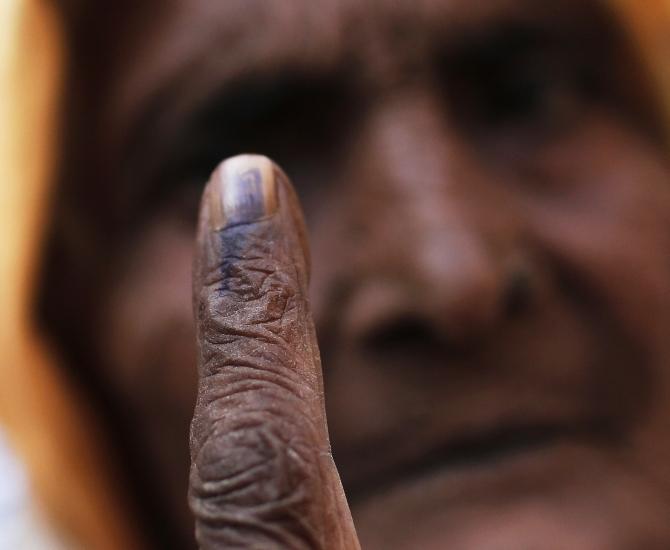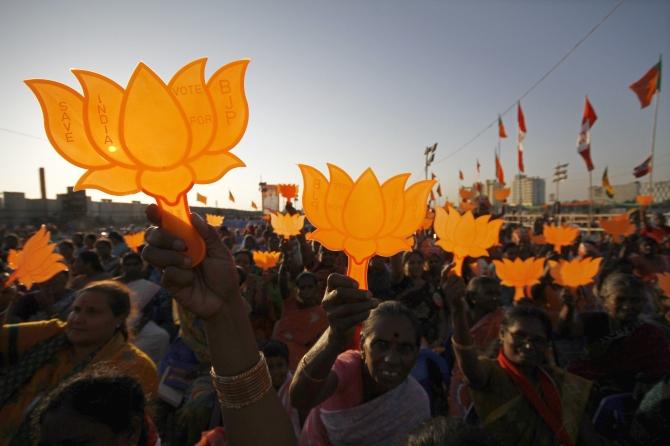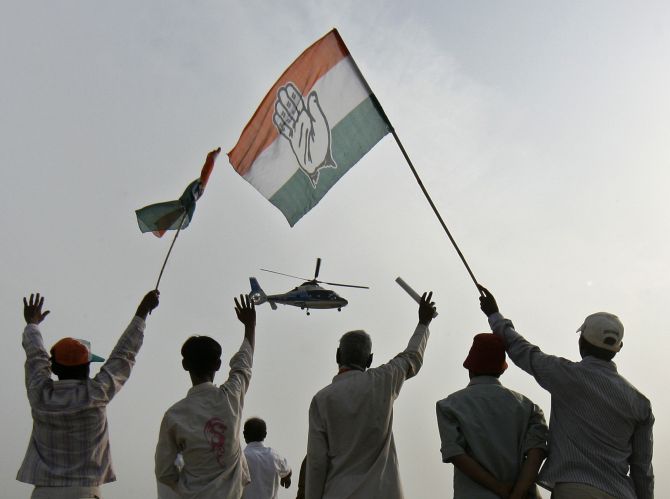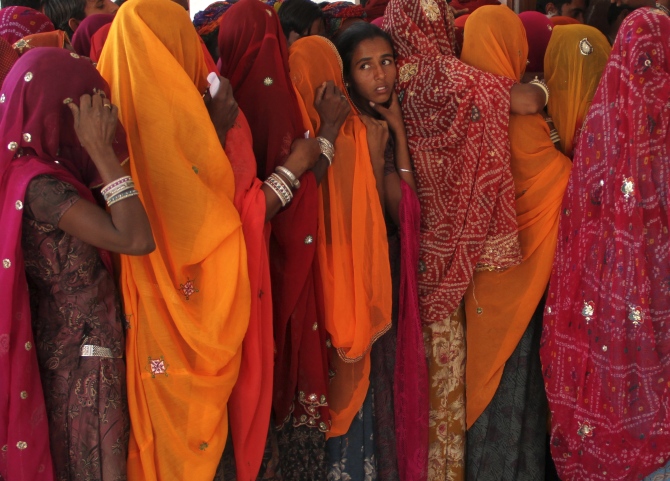 | « Back to article | Print this article |
Lok Sabha elections 2014: The battle begins on Monday
The high-stakes battle in the virtual Presidential-style contest between BJP prime ministerial candidate Narendra Modi and Congress Vice President Rahul Gandhi with a few other regional satraps also in the fray in the Lok Sabha elections begins on Monday in six constituencies in two states in the first of the nine-phased polls.
Five constituencies in Assam -- Tezpur, Kaliabor, Jorhat, Dibrugarh and Lakhimpur and Tripura (West) in Tripura – will go to polls on Monday.
Campaign has already ended in these constituencies and the candidates have mounted door-to-door contact with the electorate seeking their votes.
Unlike in the past, neither factions of the ULFA, pro or anti-talks, have issued diktats to the voters for boycott of the elections or made any statement against any political party.
The Congress, Bharatiya Janata Party, Trinamool Congress, All India United Democratic Front, Asom Gana Parishad, Aam Aadmi Party, Socialist Unity Centre of India, Communist Party of India-Marxist), All India Forward Bloc and Samajwadi Party are contesting in the five seats in Tezpur, Koliabor, Jorhat, Dibrugarh and Lakhimpur in the Congress ruled state.
Know your candidate before you vote
Follow the latest election updates on Twitter: @RediffElections
Click NEXT to read further...
Lok Sabha elections 2014: The battle begins on Monday
Among the 51 candidates are union ministers Ranee Narah and Paban Singh Ghatowar, former union minister and sitting MLA Bijoy Krishna Handique, Chief Minister Tarun Gogoi's son Gourav Gogoi and Bhupen Kumar Bora for the Congress.
Congress rebel and Independent candidate Moni Kumar Subba is also contesting.
For the BJP are its state unit president Sorbananda Sonowal and Kamakhya Prasad Tasa and for the AGP Arun Kumar Sarma, Pradip Hazarika and Joseph Toppo.
A pro-talk ULFA commander Heera Sarania alias Naba Kumar Sarania, is contesting as an Independent with the support of several non-Bodo organisations there.
In the Left Front-ruled Tripura, the election will witness a multi-cornered contest among CPM, Congress, Trinamool Congress and the BJP.
In the second and third phase on April 9 and 10, a total of 93 constituencies spread across 18 states will go to polls.
On April 9, seven constituencies in five states and on April 10, 86 constituencies in 13 states -- including Delhi which has seven seats--will elect members to the Lok Sabha.
On Saturday, April 12 five constituencies in three states will go for polls.
A maximum of 122 constituencies spread across 13 states will participate in the electoral exercise on April 17.
A total of 117 Parliamentary constituencies in 12 states will go for polls on April 24.
April 30 will witness Lok Sabha elections to 89 constituencies across nine states, the 8th phase of polling on May 7 will see voting in 64 constituencies in seven states.
The 9th and the last phase of general election will be held on May 12 in which electorate of 41 constituencies spread across 3 states will exercise their franchise.
Arunachal Pradesh will have single day polling on April 9 to cover two constituencies, while Assam with 14 Lok Sabha seats will have a three-day poll on April 7, 12 and 24.
Click NEXT to read further...
Lok Sabha elections 2014: The battle begins on Monday
Battle state of Bihar with 40 constituencies will have polling on six days beginning April 10, 17, 24, 30 and May 7 and 12.
Naxal-hit state of Chhattisgarh will witness a three-day poll on April 10, 17 and 24 to elect 11 MPs, while the small state of Goa with two constituencies will have a single day polling on April 17.
Gujarat (26 seats), Haryana (10) and Himachal Pradesh (4) will have a single day polling on April 30, April 10 and May 7 respectively. Kerala (20) and Karnataka (28) will also have a single day polling on April 10 and 17 respectively.
Jammu and Kashmir with six Lok Sabha seats will witness polling on five days on April 10, 17, 24, 30 and May 7, while Jharkhand with 14 seats will go to polls on three days – April 10, 17 and 29 seats in Madhya Pradesh and 48 seats in Maharashtra will go to polls on three days - April 10, 17 and 24.
Two seats in Manipur will go to polls on April 9 and 17 while its neighbours Meghalaya (2), Mizoram (1) and Nagaland (1) will go to polls on a single day on April 9.
Odisha (21 LS seats) will have a two day polling on April 10 and 17 to elect 10 and 11 constituencies respectively. On the same days, Assembly elections will be held on 70 and 77 assembly segments respectively.
Punjab will have a single-day polling on April 30 to elect 13 MPs, while Tamil Nadu (39 seats) and Puducherry (1) and will go to polls on April 24. Uttarakhand (5) will go to polls on May 7.
Click NEXT to read further...
Lok Sabha elections 2014: The battle begins on Monday
Voters in Rajasthan with 25 seats will exercise their franchise on April 17 and 24 to elect 20 on the first day and 5 MPs on the other day.
Sikkim's lone Lok Sabha seat will go to polls on April 12 while simultaneously electing its 32-member Assembly.
Tripura with two seats will witness a two-day poll on April 7 and 12 while heartland Uttar Pradesh will choose 80 MPs on six days on April 10, 17, 24, 30 and May 7 and 12.
West Bengal will go to polls on five days to elect 42 MPs on April 17, 24, 30, May 7 and 12.
NCT of Delhi with seven seats will have a single day poll on April 10. Likewise the Union Territories of Andaman and Nicobar Islands, Chandigarh and Lakshadweep will choose their lone representatives on April 10, while Dadra and Nagar Haveli and Daman and Diu will elect their sole representatives on April 30.
The total electorate in the country as per final published E-rolls with January 1, 2014 as the cut-off date is about 81.45 crore compared to 71.3 crore in 2009, an increase of more than 10 crore electors.
TOP photo features you missed last week
Click on MORE to see another PHOTO feature...




